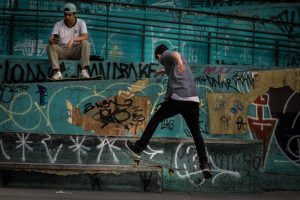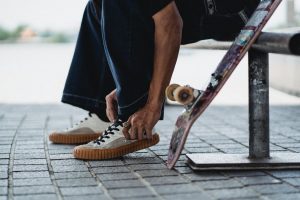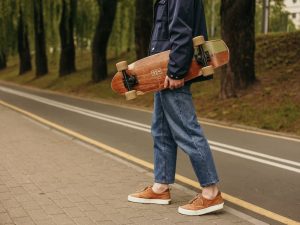The skateboard fashion trend is all about style, constantly evolving to embrace the latest fashion and influences of the trend. It often leads the way in setting the pace for this fashion trend, blending comfort, functionality, and individuality. From iconic fashion brands to fresh, aesthetics, the clothing style of riding boards continues to shape the scene’s distinctive style.

In our exploration of the vibrant history of the skateboard, we can’t overlook its powerful influence on the fashion industry. From its humble beginnings in the 1960s to the present day, skating has always been about much more than just skateboard tricks and wheels – it’s a lifestyle that’s shaped generations of street style trends.
We’re going to delve into this fascinating evolution, tracing how skateboard fashion has evolved over decades and reflecting on its impact on mainstream beauty culture. From the laid-back fashion trend of the ’60s and ’70s to punk-inspired fashion of the ’80s, grunge and hip-hop-influenced styles of the 90s, fit up to modern skateboarding trends – we’ve got it all covered.
Whether you’re an avid skateboarder or a style enthusiast intrigued by unique subcultures, we’ll guide you through this journey with an insider’s perspective. So, if you want to ride skateboards through these stylish eras that have given us more than just a sport, you’ve come to the right place.
Since the early years of the sport and the classic 1990s looks made popular by icons like Tony Hawk, skater style has always had a big impact on mainstream fashion. Bold designs and an edgy look have made Thrasher Magazine a mainstay of skate-inspired fashion. Even upscale labels like Louis Vuitton and trend reports have included skate culture components in their designs, demonstrating the broad influence of this distinct subculture.
Key Takeaways
We’ll journey through the history of skateboarding, exploring its origins in the 1960s and how it has evolved into modern fashion trends. Skate fashion is more than just a way to look cool—a statement of rebellion, a form of self-expression, and an emblem of skateboard culture’s identity.
At FamilyHype, we appreciate and respect skate fashion as an essential part of skateboard culture’s vibrant fabric. Remembering the backstory of a skater’s fashion the next time you spot someone rocking with their skateboards.
Skate fashion is more than just a style choice. It’s a representation of their fashionable expression and a reflection of skateboard culture. So, take time to reflect on fashion trends & its significance to skateboarding culture.
Skate Fashion
1960s
The iconic images of 1960s skaters have been burned into our culture’s collective memory, but do you know the origin story of their laid-back and rebellious style? Surfing’s impact and California culture played a major part in setting the street stage for skate culture’s unique look.
1970s
In the ’70s, skate culture began to carve its path in fashionable attire, setting the tone for skateboarders’ generations to come. Skateboarding’s branding evolution meant the appearance of logos became key identifiers, such as Powell Peralta, Santa Cruz, and Vision Street Wear. The emergence of pool skating, which was characterized by its full-length skateboards, wide trucks, and thick wheels, influenced a shift towards durable and functional garments.
In the 1970s, skate pants and skate shorts, often paired with a graphic tee, became a staple in the skateboarding community, epitomizing functional clothing with a stylish edge. World brands like Ralph Lauren and Comme des Garçons made their mark in this era, influencing popular culture and transforming skate attire into a global phenomenon. The Fairfax District, known for its eclectic vibe and vibrant skate parks, saw skate-ready sneakers emerge as the go-to choice for skaters. This trend, later popularized by celebrities like Justin Bieber, further cemented skate fashion’s place in mainstream style.
Loose fitting clothes, reminiscent of the punk rock era, and accessories like trucker hats became iconic elements of skater fashion. Social media played a crucial role in spreading these styles, showcasing the skateboarding lifestyle and its unique fashion choices to a broader audience.
1980s
As soon as the ’80s hit, punk rock’s rebellious spirit had a major influence on skate culture and style. Punk aesthetics, including spiked hair, studded leather jackets, and ripped jeans, blended with DIY culture, allowing skaters to showcase their individualism through their style choices and broadening the definition of skate style. This period saw the rise of iconic skatewear, such as the iconic Thrasher hoodies, Vans sneakers, and skate tees. Loose fitting clothing became popular, reflecting the laid-back yet edgy vibe of the era. Trucker hats also made their way into the skate scene, adding to the rugged and rebellious look. Punk fashion had a big impact on skate fashion in the 1980s, helping to shape the look of skateboarding for years to come.

1990s
Let’s dive into the ’90s era when rock, grunge, and hip-hop left their indelible mark on skateboard fashion trends. The adoption of the grunge fashion trend brought long hair, flannel shirts, baggy jeans, and beanies into play, while hip-hop style’s impact was seen in oversized T-shirts, chunky sneakers, and bandanas. This trend of self-expression was also seen in skateboarding culture, where skateboards, trucks, wheels, and bearings were used in creative ways to express personality.
In the 1990s, skate fashion was characterized by its rebellious and laid-back trend, heavily influenced by the grunge and hip-hop cultures of the time. Oversized graphic T-shirts, baggy jeans, and comfortable skate shoes, epitomized by brands like Vans and Etnies, became iconic within the skateboarding community. Fashionable accessories such as beanies, trucker hats, and wallet chains were not just functional but also a crucial part of the skateboarder’s identity. This era saw the emergence of skateboarding not just as a sport but as a lifestyle, with its fashion elements permeating mainstream youth culture. Additionally, the influence of punk rock continued to linger, blending seamlessly with the other styles and adding an edge to the overall look.
2000s
Moving into the 2000s, you’ll notice a significant shift in skate fashions, heavily influenced by streetwear and pop culture. This era saw the rise of influential skateboarders in the 2000s, like Tony Hawk, who popularized brands like Quicksilver and DC shoes. These 2000s skateboarding brands became synonymous with the fashion trend and skate community. Skateboarding in the 2000s saw the rise of a unique street style consisting of baggy jeans, cargo pants, cargo shorts, and skate shoes. The graphic T-shirt also became quite popular.
Additionally, skate fashion of the 2000s saw the introduction of popular skate brands such as Volcom and Element, as well as the popularization of streetwear brands like Supreme, Adidas, and Nike SB. However, Supreme is more of a fashion label like Louis Vuitton than a skate brand these days. Skateboarding has always been a sport that allows its participants to express themselves through their style, and the 2000s saw this notion reach the mainstream.
Modern
The skateboard scene is alive and thriving, with skate fashion continuing to push boundaries and redefine norms in recent years. Here at FamilyHype, we love to celebrate skate culture and its unique contributions to the fashion world.
We’re seeing an impressive evolution in skate shoe design that combines performance and style. There is also a rise in the popularity of gender-inclusive skate fashion and trends, with loose fitting clothing becoming a staple. More modern skateboarding clothing, like chino shorts you can pair with boxy tees or hoodies, is also on the rise. Skate shops and skate parks are buzzing with these new styles, often highlighted in trend reports and celebrated on social media.
New brands are creating eco-conscious skate gear to protect our planet, and the influence of punk rock is evident in many of these designs, with trucker hats making a notable comeback. Additionally, classic retro fashionable aesthetics are resurgent, honoring our skateboarding roots.

Skate Fashion Conclusion
In conclusion, skateboard fashion trends today have made their mark beyond the streets of street skating, even appearing on the runway during fashion week. Skate brands have evolved to provide excellent customer care and a wide range of products, from high-top sneakers to skateboard decks, catering to the diverse tastes of skateboard enthusiasts and fashion-forward individuals alike.
So, we have journeyed through the history of skateboarding fashion, exploring its origins in the 1960s and how it has evolved and inspired modern style. Skate fashion is more than just a way to look cool. It’s a statement of rebellion, a form of self-expression, and an emblem of skateboard culture’s identity. From loose fitting jeans and trucker hats to the punk rock influence seen in skater attire, these elements have all shaped the skateboarding aesthetic.
Here at FamilyHype, we appreciate and respect skate fashion as an essential part of skateboard culture’s vibrant fabric. So the next time you spot a skater rocking their gear at skate parks or featured on social media, remember the backstory of their look. As we explore fashion styles in skateboarding through the ages, it’s important to connect them to skateboards and the culture surrounding them.
We invite readers to share their thoughts and opinions on this topic and others related to skateboarding. Influenced by skater style and legends like Tony Hawk, skate fashion is recognized by high-end brands such as Louis Vuitton, which have incorporated elements of skate fashion into their collections. Whether you’re shopping at skate shops or following the latest trends, skateboarding fashion continues to evolve and inspire.
Skate Fashion: FAQs
How Did Skateboarding Influence Modern Trend?
You can witness the influence of skater fashion in today’s popular clothing, particularly in pieces like Nike SBs, plaid shirts, trucker caps, cargo pants, skate shoes, and more, all reflecting a strong skateboarding fashion trend.
What Are The Long-Term Effects Of Riding Skateboards To A Person?
The strain caused by the repetitive motions required while skateboarding may result in foot and heel issues in the long run. These issues in skateboard riding include plantar fasciitis, bone spurs, and stress fractures.
What Are The Most Common Injuries Riding Skateboards?
The most common skateboarding injuries include head injuries and broken bones, particularly wrists, arms, and legs.
What Should I Do If I’m Scared Of The Sport Skating?
The best way to gain more confidence while skateboarding is by practicing in a safe environment. Don’t feel disheartened if you don’t improve immediately. Learning how to skateboard takes time and practice.
Why Do Skaters Need To Dress Like That When Doing The Skateboarding Sport?
Skaters typically wear baggy clothing because it is comfortable and allows for movement. Baggy clothes don’t restrict your range of motion. Skaters also tend to pick clothes made from durable materials that can withstand wear and tear. Recent skateboarding fashion and trendy styles blend skater style with high-end labels like Louis Vuitton and Gucci, as seen in collaborations with Crenshaw Skate Club, a notable player in the skate industry.
Why Do Skaters Wear Converse Shoes When Doing That Sport Skating?
Is Riding Skateboard Good For The Body?
Yes. Skateboarding helps improve balance and coordination. Skateboarding is also great for your cardiovascular health.
Is Riding A Skateboard Considered As High-Risk?
Yes. Skateboarding is considered a high-risk sport, with around 70,000 reported visits to the emergency room each year.
How Do You Stay Safe While Riding Skateboards?
Always wear protective gear, especially helmets, knee pads, elbow pads, and wrist guards while riding skateboards. Also, learn how to fall safely to avoid severe injuries in the event of an accident.
What Clothing Fashion Does Riders Wear When Do This Sport?
Last Updated on July 3, 2024 by Harold Chan
DISCLAIMER (IMPORTANT): This information (including all text, images, audio, or other formats on FamilyHype.com) is not intended to be a substitute for informed professional advice, diagnosis, endorsement or treatment. You should not take any action or avoid taking action without consulting a qualified professional. Always seek the advice of your physician or other qualified health provider with any questions about medical conditions. Do not disregard professional medical advice or delay seeking advice or treatment because of something you have read here a FamilyHype.com.